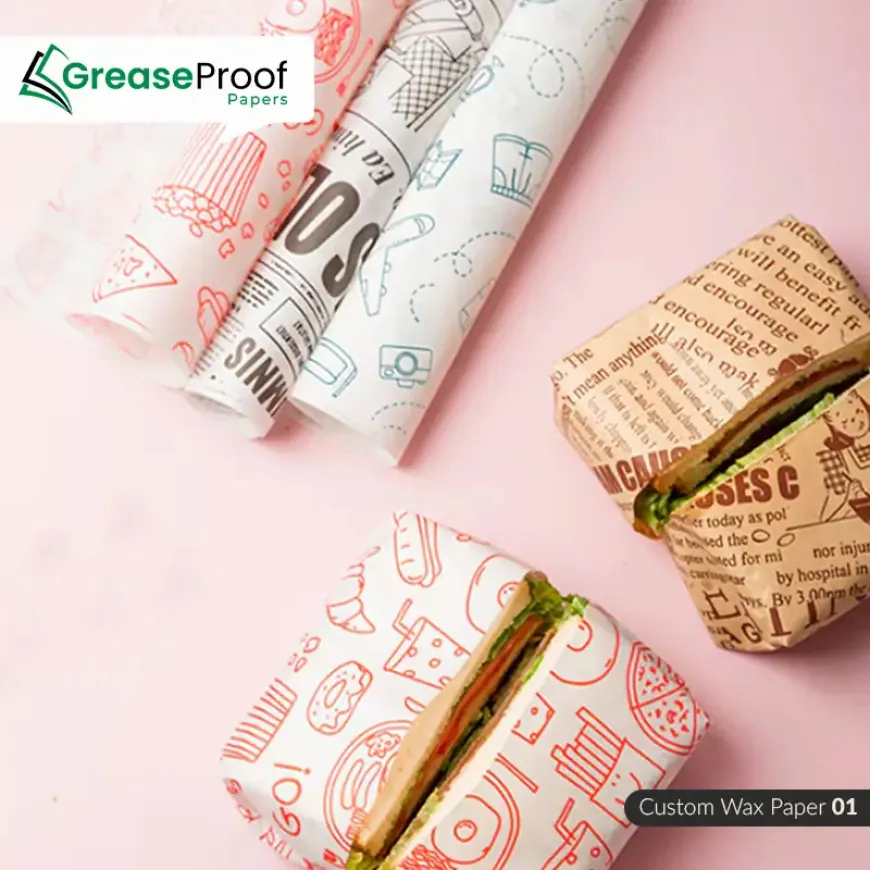The Versatility and Benefits of Custom Wax Paper
Discover the versatility and benefits of custom wax paper for food packaging. Learn about custom wax paper sheets, bags, pricing, and eco-friendly options for restaurants.

In the realm of packaging and food presentation, custom wax paper has emerged as a favorite choice for businesses across various industries. Known for its versatility, durability, and aesthetic appeal, this product plays a vital role in the food service sector, particularly in restaurants and catering. Whether you're wrapping sandwiches, displaying baked goods, or serving takeout, custom wax paper sheets and custom wax paper bags offer a blend of functionality and style that can elevate your brand. This article delves into the various aspects of custom wax paper, its applications, pricing considerations, and how it can be an asset to your restaurant or food business.
What is Custom Wax Paper?
Custom wax paper is a type of paper coated with a layer of wax, making it resistant to moisture and grease. This property allows it to be an excellent barrier for food items, preventing them from becoming soggy or greasy. It’s widely used in the food industry, particularly in restaurants, bakeries, and cafes, due to its ability to keep food fresh and appealing.
Benefits of Using Custom Wax Paper Sheets
Custom wax paper sheets offer several advantages, making them an essential component of food packaging. Here are some key benefits:
-
Moisture Resistance: The wax coating provides a protective barrier against moisture, ensuring that food items stay dry and maintain their texture.
-
Grease Resistance: Ideal for greasy foods like fried items, custom wax paper prevents oil from seeping through and affecting the appearance of packaging.
-
Customization Options: Businesses can print logos, designs, or any other branding elements on custom wax paper sheets, enhancing their marketing efforts and making products stand out.
-
Eco-Friendly Choices: Many manufacturers now offer biodegradable or compostable wax papers, appealing to environmentally conscious consumers.
Applications of Custom Wax Paper in Restaurants
When it comes to the food industry, custom wax paper bags and sheets find numerous applications:
-
Takeout Packaging: Many restaurants use custom wax paper bags for takeout orders. These bags protect the food while providing a branded touch that enhances the customer experience.
-
Food Presentation: Bakeries often use custom wax paper sheets to wrap pastries and desserts, showcasing them attractively while ensuring they remain fresh.
-
Sandwich Wraps: For delis and sandwich shops, custom wax paper sheets are perfect for wrapping sandwiches, allowing for easy handling and consumption without the mess.
-
Picnic and Party Packs: Food items served at events can be presented using custom wax paper, making it easy for guests to grab food on the go.
Custom Wax Paper Price Considerations
When planning to incorporate custom wax paper into your business, understanding the custom wax paper price is essential. Several factors can influence the cost:
-
Material Quality: The type of wax and paper used will affect pricing. Higher-quality materials may cost more but offer better performance.
-
Printing Options: Custom printing adds to the overall cost, especially for complex designs or multiple colors.
-
Order Volume: Bulk orders often come with discounts, making them more economical in the long run.
-
Supplier Differences: Prices may vary among suppliers based on their production methods and distribution channels. Always compare quotes and services.
Advantages of Using Custom Wax Paper Food Packaging
Custom wax paper food packaging has numerous benefits for businesses:
-
Cost-Effective: Compared to other packaging materials, wax paper is relatively inexpensive, allowing businesses to save on packaging costs without sacrificing quality.
-
Versatile Use: It can be used in various applications, from wrapping food items to creating attractive display layers in food cases.
-
Safety: Since it’s food-safe, businesses can confidently use custom wax paper without worrying about contamination.
Environmental Considerations
In today’s market, consumers are increasingly looking for eco-friendly products. Many suppliers offer custom deli paper made from sustainable sources or biodegradable options, allowing businesses to align with green practices. By choosing environmentally responsible wax paper, companies can appeal to eco-conscious customers and reduce their environmental footprint.
Conclusion
The rise of custom wax paper in the food industry is no coincidence. Its combination of practicality, versatility, and customization options makes it a powerful tool for businesses looking to enhance their brand image while providing quality packaging solutions. Whether used in custom wax paper sheets or custom wax paper bags, this packaging solution is essential for restaurants and food service providers. By understanding the benefits, applications, and cost factors of custom wax paper, businesses can make informed decisions that positively impact their operations and customer satisfaction.
FAQs
What is custom wax paper?
Custom wax paper is a type of paper coated with wax, making it resistant to moisture and grease. It's commonly used in food packaging and presentation.
How is custom wax paper used in restaurants?
Restaurants use custom wax paper sheets and custom wax paper bags for various applications, including takeout packaging, food presentation, and wrapping sandwiches.
What are the benefits of using custom wax paper food packaging?
Custom wax paper food packaging is cost-effective, versatile, and safe for food, making it a popular choice for businesses.
How much does custom wax paper cost?
The custom wax paper price varies based on material quality, printing options, order volume, and supplier differences.
Are there eco-friendly options for custom wax paper?
Yes, many suppliers offer biodegradable or compostable custom wax paper, allowing businesses to reduce their environmental impact.

 Michael george
Michael george 










